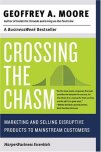I’m currently reading Crossing the Chasm (Geoffrey A. Moore). A friend recommended it to me when I told him I was struggling with the idea of selling services from my startup, Inkzee, to the enterprise. It’s an old book, (1991, revisited in 1999, old in terms of the tech scene), but the ideas and tips are surprisingly valid nowadays.
 One of the key ideas for a successful “chasm crossing“, or selling an idea to the mainstream markets is to create a reference market to which your product/service can be compared on the heads of your clients. This principle is fairly easy to follow, but quite complex in nature. It taps into the way our brain works and it’s not the first time I’ve stepped onto it. Some months ago I finished reading another book, Predictably Irrational by Dan Ariely. It’s not an awesome book, but holds some very interesting insights into how humans react to different situations. One of the examples was about getting the correct pricing, or what the author calls the anchor price.
One of the key ideas for a successful “chasm crossing“, or selling an idea to the mainstream markets is to create a reference market to which your product/service can be compared on the heads of your clients. This principle is fairly easy to follow, but quite complex in nature. It taps into the way our brain works and it’s not the first time I’ve stepped onto it. Some months ago I finished reading another book, Predictably Irrational by Dan Ariely. It’s not an awesome book, but holds some very interesting insights into how humans react to different situations. One of the examples was about getting the correct pricing, or what the author calls the anchor price.

Both ideas are rooted on the same principle. On the first case, the author suggests that when selling something innovative, that has no competition, the way to go is to create that competition. How do you create that competition? Easy, you introduce 2 new concepts, the alternative market and the alternative product. You need to position your product close to a well know market by the customer. For example, if you’re selling an online word editor, you could make yourself close to the market of desktop word processors, aka Microsoft Word, that will be your alternative market. It’s a market known by the customer, where they buy from and most importantly, they have an allocated budget to buy from it. By positioning next to that market, the client can make comparisons between your product and what they’re already using. In other words, you create an anchor they can use to compare you against. You set yourself into a preexisting category in the customers head. The problem is that you need to differentiate your product from that preexisting market. The way to do this is by referencing your alternative product, that is, a product or service that is similar to yours, and is market leader but in a different market niche. In this example, you could name something like Salesforce.com. So you end up with a punch line like, “our online word processor is like the salesforce word processor”. So, in conclusion, the idea is to create an anchor point and a differentiating value proposition.
Now, in Predictably Irrational they idea was very similar. Instead of focusing on a product sales proposition, t he domain was the pricing of a product. The example the author gave was the pricing of a subscription. An offer goes as follows, an annual subscription to The Economist (online access) costs $59. An annual subscription to The Economist (print) costs $125. Finally, an annual subscription (print and online access) costs $125. Which one would you choose? Chances are that the last one. Why is it like that? Truth is, that humans can’t value things without any reference. We always draw conclusions from comparisons. Our mind works under a cause/effect paradigm, that is, if the paper edition (lets symbolize the concept paper edition with the A symbol) costs $125 (B is the price), and online + paper (C) costs $125 (B as it’s the same price symbol as before) and online + paper (C) is better than only paper (A) then (here comes the effect) option C (paper + internet edition for $125) is the best one.
he domain was the pricing of a product. The example the author gave was the pricing of a subscription. An offer goes as follows, an annual subscription to The Economist (online access) costs $59. An annual subscription to The Economist (print) costs $125. Finally, an annual subscription (print and online access) costs $125. Which one would you choose? Chances are that the last one. Why is it like that? Truth is, that humans can’t value things without any reference. We always draw conclusions from comparisons. Our mind works under a cause/effect paradigm, that is, if the paper edition (lets symbolize the concept paper edition with the A symbol) costs $125 (B is the price), and online + paper (C) costs $125 (B as it’s the same price symbol as before) and online + paper (C) is better than only paper (A) then (here comes the effect) option C (paper + internet edition for $125) is the best one.
- A -> B
- C -> B
- C > A
As we see from the simple logic equations from above, without [3] we can’t choose between the first 2 options. We need something to compare against. In the prices example, we are creating an anchor price, $125, something we know the value of, the printed edition of a magazine (our alternative market). We then offer a new product, innovative, something we aren’t familiar with, the online access to a publication. By virtue of putting it next to the magazine realm (in this case by virtue of the same price) we create a connection between both propositions. The problem is that we need a 3rd cornerstone to allow humans to see the difference, to be able to choose. In this example we are using a quantitative approach to choose, 2 things are better than 1, specially if that 1 thing is part of the other offer.

In the product example we use the product alternative to create a point of reference to which we compare the product to. In the former case the equation [3] isn’t as clear and powerful as in the subscription example, but plays the same role, a way to quantify and compare your product. For example, Microsoft Word (A) is part of the desktop publishing tools market (B), our product (C) is on a similar market (B). Salesforce.com (C’) is doing great and it’s similar than our product but in a different market niche (D). There fore, our product must be as good as Salesforce but in the market of desktop publishing.
- A -> B
- C -> B
- C’ ~= C (similar products)
- C’ best in D
- C > A
As you see, the train of thought is slightly more complex, but ends up with a similar conclusion. Granted that it’s not as straightforward as the pricing example and you need to probe both [3] and [4] to get the client to buy into your proposition, but it’s much easier to do that, than to try and sell it blindly.
Ahh, the beauties of neuromarketing 😉


 try to debunk it because I feel it’s one of the most wide spread problems with many people. First of all, there are many definitions for “important“, and worst of all it’s that this definition varies depending on who you talk with. For me, someone important is someone that has an incredible track record and that has demonstrated many times that he’s truly incredible. I would like to stress the importance of “many times” because I think it’s a key concept in my definition. Someone that got lucky once and got fame and money isn’t as important to me as someone that has proven many times his/her skills or knowledge. The problem to me is that not many people share this definition. For most of them, someone important is someone that has been exposed to the media in some way or another. That means, someone that has been written about in a nationwide newspaper, magazine or A-list blog, someone that has been a TV guest in some television program or someone that has been interviewed in a radio program, turns out to be, for a great chunk of the population, someone famous.
try to debunk it because I feel it’s one of the most wide spread problems with many people. First of all, there are many definitions for “important“, and worst of all it’s that this definition varies depending on who you talk with. For me, someone important is someone that has an incredible track record and that has demonstrated many times that he’s truly incredible. I would like to stress the importance of “many times” because I think it’s a key concept in my definition. Someone that got lucky once and got fame and money isn’t as important to me as someone that has proven many times his/her skills or knowledge. The problem to me is that not many people share this definition. For most of them, someone important is someone that has been exposed to the media in some way or another. That means, someone that has been written about in a nationwide newspaper, magazine or A-list blog, someone that has been a TV guest in some television program or someone that has been interviewed in a radio program, turns out to be, for a great chunk of the population, someone famous.


